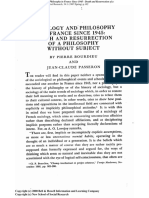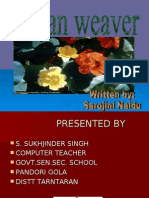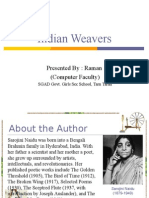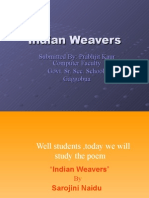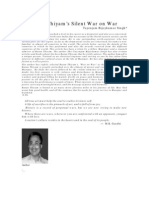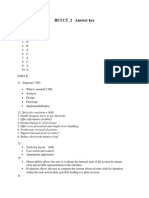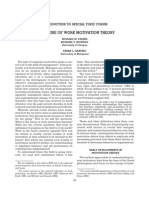R. K. Narayan's 'An Astrologer's Day' / 239
R. K. Narayan's 'An Astrologer's Day' / 239
Uploaded by
KiruthikaCopyright:
Available Formats
R. K. Narayan's 'An Astrologer's Day' / 239
R. K. Narayan's 'An Astrologer's Day' / 239
Uploaded by
KiruthikaOriginal Title
Copyright
Available Formats
Share this document
Did you find this document useful?
Is this content inappropriate?
Copyright:
Available Formats
R. K. Narayan's 'An Astrologer's Day' / 239
R. K. Narayan's 'An Astrologer's Day' / 239
Uploaded by
KiruthikaCopyright:
Available Formats
Chapter 8
R. K. Narayan's
'An Astrologer's Day'
About the author, R. K. Narayan
Rasipuram Krishnaswami Narayan (1906 - 2002) is one of the
best - known of Indian English writers. He was born and brought up in
Madras. He began by contributing items to a city newspaper. When
Punch accepted one of his pieces, he embarked in earnest on his
career as a novelist and a short story writer. His writings portray the
Indian ethos with remarkable simplicity and humor. He created the
fictional world of Malgudi. A winner of the Sahitya Akademi Award
(1960) and the Padma Vibhushan (2000), he was nominated for a
term in the Rajya Sabha. His novel, The Guide (1958), has been made
into a popular film. Narayan also wrote essays, both personal and
general, an autobiography (My Days, 1974), a travelogue (My
Dateless Diary, 1964) and retold Indian epics and myths (The
Ramayana, the Mahabharata and Gods, Demons and Others).
In addition to his fifteen novels, Narayan has written more than two
hundred short stories. He is a prolific writer whose works usually
culminate in an ironic twist. He declared, "Only the story matters that
are all … if a story is in tune completely with the truth of life, truth as I
perceive it, then it will be automatically significant."
R. K. Narayan's 'An Astrologer's Day' / 239
" An Astrologer's Day" is a story about a man who runs away from
his home and pretends to be an astrologer after imagining that he has
committed a murder. In a strange situation, an ironic twist of fate, he
runs into the very man he thought he had killed.
8.0 Objectives
8.1 Introduction
8.2 Short Story as a form
8.3 R.K. Narayan as a short story writer
8.4 Theme of "An Astrologer's Day"
8.5 Summary of "An Astrologer's Day"
8.6 Conclusion
8.7 Summary
- Answers to check your progress
- Field work
8. 0 Objectives
Friends, in this chapter we are going to study Short Story as a
form of Indian English Literature through the short story, 'An
Astrologer's Day' by R. K. Narayan,. The study of this chapter will
enable you to :
· Discuss short story as a form of literature.
· Narrate R. K. Narayan as a short story writer.
· Explain the style and various techniques used in the story under
discussion.
8.1 Introduction
Friends, in the last chapter, we have studied one of the great
classic novels of Indian English Literature, i.e. Kanthapura written by
one of the big three early novelists of Indian English Literature, i.e.,
Raja Rao. The novel describes the simple rustic life of a South Indian
village, Kanthapura which undergoes a sea change when the
whirlwind of Gandhian freedom struggle reaches Kanthapura and the
village enthusiastically participates in the movement.
R. K. Narayan's 'An Astrologer's Day' / 240
In the present chapter, we are moving from the novel to a short story,
'An Astrologer's Day' by R. K. Narayan. The story deals with a day's
events in the life of a good for nothing fellow turned into an astrologer
to earn his bread and butter. A single day brings in his drastic past
back before him but being a smart fellow, he finely deals with it.
8.2 Short Story as a form
Short Story signifies brevity, economy of words and short of
length. It is not just a story that is brief - it requires a particular kind of
literary construction. A broad analysis of a short story signifies three
characteristic elements:
1. Recognition of the familiar : Vivid details to create the illusion of
reality and actuality, of course, suggesting undercurrents of
meaning. Though familiar, the writer has to rid it of any kind of
banality, cliché or formula. A short story is, after all, not a
transcription of life but a dramatization of life itself.
2. Empathy : Identifying ourselves very sympathetically and closely
with the characters and situations so as to feel a part of this
actuality - the well worn theme and thus get vivified by being
individualized and
3. Readability : The good yarn pleasure tale - being absorbed by the
fascination of the tale, we are unable to put it down until we have
found out what happened. Of course, beyond the yarn lies a whole
range of meaning to be explored.
The traditional notions associated with the short story such as
design, continuity, effect, change etc are essential ingredients of a
short story. Even without the formal narrative parameters, a story can
be exciting and evocative. Due to new fissures and new frictions, new
expectations and new equations at every level, personal, family, state,
national, international, the modern short story has traversed new
grounds both in content and form. A short story is a voyage of
discovery, of self - discovery, of self - realization for the character but
more than the character, for the reader.
A short story has to have a formal plot or structure and the skill of
the author lies in making it appear as natural, as lifelike, and as
spontaneous as possible. The artist wants to make incidents or
situations appear natural rather than contrived. A well thought out plot
R. K. Narayan's 'An Astrologer's Day' / 241
is one in which nothing is superfluous or superficial. A story has to
have a beginning and should convey a constant sense of movement.
Therefore, an ideal structure would make the story interesting and true
to life as also build up suspense and arouse the reader's curiosity to
know what happens next or how the situation gets resolved at the end.
It should also give meaning to the narrative.
A good short story should strive for a unity of effect - a "single
effect". That is, a story should be compressed and economical the way
a poem is, free from digressions and irrelevancies and marked by its
intensity. It should be complete in itself and must have unity and
wholeness. A story is meant to be read at one sitting; a novel may take
days to read. So the story's effect must be sudden, powerful and
revealing whereas a novel can involve readers at a more leisurely
pace, slowly illuminating complexities and nuances.
Stories also convey psychological reality. Much of what happens
in the modern story happens in the character's minds and in the
interior world. Therefore, in attempting to reveal the drama of human
consciousness, many modern writers have stopped stressing the
orderly progression of plots, have played down external action, and
have often abandoned photographic realism in favor of a more
complex psychological realism.
In a short story, there is nothing to follow, nothing to look forward
to. The end of the short story is the end. It is marked by a sense of
finality, of definiteness, of tautness from beginning to end. It is self -
contained. Its compression induces a feeling of expanding into life, an
awareness of life expanding into our consciousness, enlarging our
consciousness. In this sense a short story imparts the sense of a
discovery.
8.3 R. K. Narayan as a short story writer
R. K. Narayan is one of the three leading figures of early Indian
literature in English, along with Mulk Raj Anand and Raja Rao. He is
credited with bringing Indian literature in English to the rest of the
world and is regarded as one of the India's greatest Indian English
novelists. The setting for most of Narayan's stories is the fictional town
of Malgudi, first introduced in Swami and Friends. His narratives
highlight social context and provide a feel for his characters through
R. K. Narayan's 'An Astrologer's Day' / 242
everyday life. He has been compared to William Faulkner, who also
created a fictional town that stood for reality, brought out the humor
and energy of ordinary life and displayed compassionate humanism in
his writing. Narayan's short story writing style has been compared to
that of Guy de Maupassant as they both have an ability to compress
the narrative without losing out on elements of the story. With this
book, Narayan created Malgudi, a town that creatively reproduced the
social sphere of the country; while it ignored the limits imposed by
colonial rule. Malgudi also grew with the various socio-political
changes of British and post-independence India.
He also published two collections of short stories: Malgudi Days
(1982), a revised edition including the original book and some other
stories and Under the Banyan Tree and Other Stories, a new
collection. Narayan's writing style was simple and unpretentious with
a natural element of humor about it. It focused on ordinary people,
reminding the reader of next-door neighbors, cousins and thereby
providing a greater ability to relate to the topic. Unlike his national
contemporaries, he was able to write about the intricacies of Indian
society without having to modify his characteristic simplicity to
conform to trends and fashions in fiction writing. He also employed the
use of nuanced dialogic prose with gentle Tamil overtones based on
the nature of his characters. Critics have considered Narayan to be
the Indian Chekhov, due to the similarities in their writings, the
simplicity and the gentle beauty and humor in tragic situations. Greene
considered Narayan to be more similar to Chekhov than any Indian
writer.
According to Pulitzer Prize winner, Jhumpa Lahiri, Narayan's short
stories have the same captivating feeling as his novels, with most of
them less than ten pages long, and taking about as many minutes to
read. She adds that between the title sentence and the end, Narayan
provides the reader something novelists struggle to achieve in
hundreds more pages: a complete insight to the lives of his
characters. These characteristics and abilities led Lahiri to classify him
as belonging to the pantheon of short-story geniuses that include O.
Henry, Frank O'Connor and Flannery O'Connor. Lahiri also compares
him to Guy de Maupassant for their ability to compress the narrative
without losing the story and the common themes of middle-class life
written with an unyielding and unpitying vision.
R. K. Narayan's 'An Astrologer's Day' / 243
Critics have noted that Narayan's writings tend to be more descriptive
and less analytical; the objective style, rooted in a detached spirit,
providing for a more authentic and realistic narration. His attitude,
coupled with his perception of life, provided a unique ability to fuse
characters and actions and an ability to use ordinary events to create
a connection in the mind of the reader. A significant contributor to his
writing style was his creation of Malgudi, a stereotypical small town,
where the standard norms of superstition and tradition apply.
Narayan's writing style was often compared to that of William
Faulkner since both their works brought out the humor and energy of
ordinary life while displaying compassionate humanism. The
similarities also extended to their juxtaposing of the demands of
society against the confusions of individuality. Although their approach
to subjects was similar, their methods were different; Faulkner was
rhetorical and illustrated his points with immense prose while Narayan
was very simple and realistic, capturing the elements all the same.
There are some critics who find fault with Narayan for the ending of his
stories in an unconvincing way. Just like O'Henry, he ends some of his
stories with a 'sudden reversal of situation.'
Narayan's greatest achievement was making India accessible to
the outside world through his literature. He is regarded as one of the
three leading Indian English language fiction writers, along with Raja
Rao and Mulk Raj Anand. He gave his readers something to look
forward with Malgudi and its residents and is considered to be one of
the best novelists India has ever produced. He brought small-town
India to his audience in a manner that was both believable and
experiential. Malgudi was not just a fictional town in India but one
teeming with characters, each with their own idiosyncrasies and
attitudes, making the situation as familiar to the reader as if it were
their own backyard.
8.4 Theme of "An Astrologer's Day"
The theme of the story focuses on a single day in the life of an
ordinary astrologer who suddenly faces past life in the present drastic
situation. The story has a twist in the tale. The otherwise adventure
less life of the astrologer suddenly poses a grave problem from his
past life and demands alertness to tackle the situation. The story
R. K. Narayan's 'An Astrologer's Day' / 244
describes of a single day in the lives of the sleepy town of Malgudi.
The story also deals with the darker side of human nature with its
hypocrisies, shrewdness, revengeful nature and selfishness. The
characters in the story are no exception to these qualities of human
nature. Finally all is well that ends well with the astrologer coming out
with flying colors in his examination of befooling his opponent, saving
his life and also saw to it that he does not face the man again in future.
8.5 Summary of "An Astrologer's Day"
"The Astrologer's Day" is a short story which deals with a day in
the life of an ordinary but fake astrologer. The setting of the story is a
town, Malgudi which is located in South India, near to Madras. It is not
a story of contemporary times but pre - independence times.
The story opens at the midday. This is the time when the
astrologer opens his business. The writer describes how he begins his
business. He removes all his professional equipment like cowries
shells, charts, Palmyra writing etc. He is also dressed typically like an
astrologer to attract customers. His forehead is bright with sacred ash
and vermilion. His eyes are assumed to have a prophetic light by his
customers. He wears a saffron turban. Thus the astrologer presented
himself so perfectly that he was consequently a point of attraction for
all the people.
The writer describes the path along the Town Hall Park where the
astrologer sits to lure his prospective customers. He carried on his
business under a tamarind tree on the Town Hall road. The path was
the right place to carry on his business as it was amply crowded with
different trades and traders like medicine sellers, hardware and junk,
magicians, cloth - sellers etc. Next to him sat a fried groundnut vendor
whose gas light enabled him to carry on his business even after
sunset.
The astrologer was a shrewd person who hardly had any
knowledge of astrology. He just made a guess work when people
approached him. He had to work hard to earn his wages. He had
absconded from his native village since he didn't want to continue the
traditional occupation of his forefathers i.e. farming. He never had any
plans to return to his native village.
He was a mastermind at analyzing human mind and psychology.
R. K. Narayan's 'An Astrologer's Day' / 245
His strong perception made him diagnose the exact problem of his
customers. His customers would finally leave satisfied.
He closed his shop for the day when his neighbor, groundnut
vendor blew out his light. On the day under description in the story, the
groundnut vendor left and the astrologer was packing up his wares
when he located a man standing before him. He perceived him to be
his prospective customer. When the astrologer invited him, he posed
a challenge before him and his astrological science. They have a deal
between them. The man gave him an anna and asked the astrologer
to answer his questions and if he doesn't answer satisfactorily he will
have to return the anna with interest. At the same time if the astrologer
is able to answer the questions satisfactorily he would give him eight
annas. But if the astrologer fails, he would pay double amount i.e.,
sixteen annas to the man. Thus the deal was finalized between them.
The astrologer prayed to the heaven. Then suddenly the astrologer
denied the challenge and requested the man to let him go. The man
said that he will not let him give in. He holds him in his grip thereby
making the astrologer shiver. Finally, the astrologer realized that he is
trapped and has no chance of moving out. The man turned out to be
a criminal by profession.
The astrologer shivered and unwillingly accepted the challenge.
He started telling about some woman but the man was not satisfied
and stopped him. He had a single question that whether he would get
what he was searching for. The man promised the astrologer that if he
is satisfied with his answers, he would pay him a rupee. The astrologer
prayed a few incantations before replying. The astrologer began with
his prophecies by saying to the man that you were left for dead in the
past and a knife has passed once on your chest. The man was excited
at this information since he had really faced it. After he got wounded,
he was thrown into a well nearby to die. A passerby saw him and
rescued him and that is how he was saved from dying. The man was
waiting to revenge the culprit who had attacked him and was in search
of the culprit who had tried to kill him. The only thing which the man
wanted to know from the astrologer was if he can find his killer.
The astrologer instantly replied that the culprit had died four
months ago in a far - off town. The man was disappointed to hear this.
The astrologer identified the name of the man before him as Guru
Nayak. He told the man that his village was a two days' journey to
R. K. Narayan's 'An Astrologer's Day' / 246
north and warned him to go back home and never to travel south
again. He asked him to return to his hometown immediately as his life
was in danger if he left his hometown again. The man replied that he
left home just to search the culprit who had tried to kill him and was
interested in knowing if he had died in a worst way. The astrologer
satisfied him by informing that the culprit was crushed under a lorry.
The man left after giving the astrologer a handful of coins. The
astrologer too winded up his belongings and went home.
The astrologer's wife was waiting for him worriedly since he was
unusually late that day. The astrologer flung the coins at his wife to
count. They were twelve and a half annas in all. She was extremely
happy to encounter that big amount. She planned to buy jaggery and
coconut for their child, who was demanding for sweets from a long
time. However, the astrologer looked worried and was not happy like
his wife. He was angry at Guru Nayak as he had cheated him. He
promised to give a rupee and actually gave only twelve and a half
annas. After dinner, he shared the secret of his life with his wife. He
said that a great burden of his life was gone that day. He always felt
that he had killed Guru Nayak. So the astrologer had run away from
his native village due to the fear of being accused as a murderer. He
settled in Malgudi and married and decided that he would never return
back to his native village. Actually the man who tried to kill Guru Nayak
was the astrologer himself. So he was able to make accurate
predictions about him though he hardly knew astrology. The astrologer
confessed to his wife that in his youth he was into bad company with
Guru Nayak. He drank, gambled and quarreled badly one day and had
a fight and had almost killed Guru Nayak.
This is how life with its unpredictable twists and turns had created
an astrologer out of a vagabond.
Check your progress
A. Choose the correct alternative :
1. From the twelve and a half annas that the astrologer earned, his
wife planned to
a. Buy fruits b. Buy vegetables c. Make sweets
2. To answer his questions, the man first gave the astrologer
a. Three pies b. Four pies c. Five pies
R. K. Narayan's 'An Astrologer's Day' / 247
3. The astrologer was able to please customers because of
a. His humor b. His honesty c. His clever guessing
B. The story contains synonyms of the expressions given
below. Locate them in the text and write them down:
1. Bright red in color
2. Expressing opinions or feelings in a loud and confident way
3. Willing or prepared to do something
4. Words that are spoken or sung to have a magical effect
5. With no people in it
C. Read the story carefully and find single words for each of
the phrases given below:
1. Bright and colorful in an impressive way
2. To hang about aimlessly
3. Showing good judgement and likely to be right
4. Acting without thinking of results
5. A large number of objects or personal possessions
D. The story contains the antonyms of the words given below.
Locate them in the text and write them down.
1. Amateur
2. Unremarkable
3. Guilty
4. Interior
5. Safety
E. Answer the following questions :
1. When did the astrologer usually start his day's business?
2. Why did the astrologer think he had committed a murder?
3. What mark did Guru Nayak have on his chest?
4. How much money did the astrologer usually charge per
question?
R. K. Narayan's 'An Astrologer's Day' / 248
5. What made the astrologer's forehead look grand?
6. How did the astrologer know the name of his customer?
7. Describe the place where the astrologer set up his daily
business.
8.6 Conclusion
Overall in this chapter, the short story 'An Astrologer's Day'
describes about a single day in the life of the astrologer. The story has
suspense and a twist in the tale towards the end. The story also uses
the co - incidence factor where the astrologer is shocked and is hardly
able to cope with the situation. His alertness of mind and smartness
as an astrologer come to his rescue. Finally, he is freed from the
burden of killing Guru Nayak.
The next chapter deals with the post - modern novel, A Fine
Balance of the diasporic writer, Rohinton Mistry.
8.7 Summary
The short story 'An Astrologer's Day' by R. K. Narayan deals with
a single day in the life of an ordinary astrologer. His day begins as any
other day but the day ends with unexpected events. When he is about
to wind up his business, he meets a rogue character, Guru Nayak who
is a part of the past life of the astrologer. Towards the end, as readers,
we receive a shock that Guru Nayak and the astrologer belong to the
same native towns. They were once upon a time good friends and had
a quarrel one day. The result was that both were into bad company
and had a fight. The astrologer tried to kill Guru Nayak by attacking
him with a knife and when Guru Nayak fainted, he threw him into a
nearby well. Fortunately, a passerby saved Guru Nayak. The
astrologer left his native village forever and became an astrologer.
Thus suddenly he confronts his past unexpectedly but smartly tackles
the situation.
Answers to check your progress
A. Choose the correct alternative :
1. - C
R. K. Narayan's 'An Astrologer's Day' / 249
2. - A
3. - C
B. The story contains synonyms of the expressions given
below. Locate them in the text and write them down :
1. Vermilion
2. Vociferousness
3. Dallied
4. Incantations
5. Deserted
C. Read the story carefully and find single words for each of the
phrases given below :
1. Resplendent
2. Surging
3. Shrewd
4. Impetuous
5. Paraphernalia
D. The story contains the antonyms of the words given below.
Locate them in the text and write them down.
1. Professional
2. Remarkable
3. Proud
4. Exterior
5. Dangerous
E. Answer the following questions:
1. Punctually at midday the astrologer usually started his day's
business.
2. The astrologer had a fight with Guru Nayak and had thrown him in
a well and he supposed him to be dead. So the astrologer thought
he had committed the murder of Guru Nayak.
R. K. Narayan's 'An Astrologer's Day' / 250
3. Guru Nayak had a mark of injury of knife on his chest.
4. The astrologer usually charged three pies per question.
5. The astrologer's forehead was resplendent with sacred ash and
vermilion and his eyes sparkled with abnormal gleam and this
made the astrologer's forehead look grand.
6. The astrologer knew the name of his customer because he was
from his hometown and an old friend of him.
7. The astrologer set up his daily business at a path running through
the Town Hall Park. He sat under the boughs of a spreading
tamarind tree which flanked a path running through the Town Hall
Park. It was remarkable in many ways: a surging crowd was
always moving up and down this narrow road morning till night. A
variety of trades and occupations was represented all along its way
: medicine sellers, sellers of stolen hardware and junk, magicians
and above all, an auctioneer of cheap cloth, who created enough
din all day to attract the whole town. Next to him in vociferousness
came a vendor of fried groundnut, who gave his ware a fancy came
each day, calling it "Bombay Ice Cream" one day, and on the next
"Delhi Almond" and on the third "Raja's Delicacy", and so on and
so forth and people flocked to him. A considerable portion of this
crowd dialed before the astrologer too. The astrologer transacted
his business by the light of a flare which crackled and smoked up
above the groundnut heap nearby. The place was lit up by shop
lights. It was a bewildering criss - cross of light rays and moving
shadows. In short, the place was perfect for the astrologer's
business.
Field work
Read the stories of other contemporary short story writers like
Mulk Raj Anand and compare them with the stories of R. K .Narayan.
Try to study the difference in their techniques of story writing.
❑❑❑
R. K. Narayan's 'An Astrologer's Day' / 251
Notes
__________________________________________________________
__________________________________________________________
__________________________________________________________
__________________________________________________________
__________________________________________________________
__________________________________________________________
__________________________________________________________
__________________________________________________________
__________________________________________________________
__________________________________________________________
__________________________________________________________
__________________________________________________________
__________________________________________________________
__________________________________________________________
__________________________________________________________
__________________________________________________________
__________________________________________________________
__________________________________________________________
__________________________________________________________
__________________________________________________________
R. K. Narayan's 'An Astrologer's Day' / 252
You might also like
- Global Work Styles Inventory" GuideDocument11 pagesGlobal Work Styles Inventory" GuideNorashadyNo ratings yet
- How To Write A Documentary ScriptDocument52 pagesHow To Write A Documentary Scriptmati1284100% (3)
- Team BuildingDocument41 pagesTeam Buildingnaziya12388% (26)
- Horace Art Poetry SummaryDocument1 pageHorace Art Poetry SummaryMiguel AntónioNo ratings yet
- Three Questions - Leo TolstoyDocument4 pagesThree Questions - Leo TolstoyYêu Văn Học100% (2)
- Wilde As ParodistDocument7 pagesWilde As ParodistNeil Nagwekar0% (1)
- San Miguel CorporationDocument36 pagesSan Miguel CorporationGlo GanzonNo ratings yet
- 0.b. Philosophy Budget of WorkDocument3 pages0.b. Philosophy Budget of Workanon_53305832775% (4)
- Bourdieu & Passeron - Sociology and Philosophy in France Since 1945, 1967Document51 pagesBourdieu & Passeron - Sociology and Philosophy in France Since 1945, 1967remisinthonNo ratings yet
- A Study Guide for R. K. Narayan's "An Astrologer's Day"From EverandA Study Guide for R. K. Narayan's "An Astrologer's Day"Rating: 5 out of 5 stars5/5 (1)
- Success Is Counted SweetestDocument3 pagesSuccess Is Counted SweetestKinza SheikhNo ratings yet
- Success Is Counted SweetestDocument4 pagesSuccess Is Counted Sweetestreyn tondoNo ratings yet
- Indian Weavers - Pandori Gola - Tarn Taran (A)Document13 pagesIndian Weavers - Pandori Gola - Tarn Taran (A)api-37312570% (1)
- First Draft:: Ozymandias Is Considered To Be A Petrarchan Sonnet, Despite The Odd RhymingDocument3 pagesFirst Draft:: Ozymandias Is Considered To Be A Petrarchan Sonnet, Despite The Odd RhymingBaberBegNo ratings yet
- The Purloined Letter by Edgar Allan PoeDocument18 pagesThe Purloined Letter by Edgar Allan PoeCarl ChiangNo ratings yet
- Ozymandias 1asfDocument4 pagesOzymandias 1asfdumitru12No ratings yet
- Analysis: "Success Is Counted Sweetest" by Emily DickinsonDocument1 pageAnalysis: "Success Is Counted Sweetest" by Emily DickinsonnaphelgeNo ratings yet
- Indian Weavers - Tarn Taran (G) - Tarn Taran (C)Document10 pagesIndian Weavers - Tarn Taran (G) - Tarn Taran (C)api-3731257No ratings yet
- Success Is Counted SweetestDocument1 pageSuccess Is Counted SweetestPRANAVNo ratings yet
- OzymandiasDocument5 pagesOzymandiassidharth_cooldude57No ratings yet
- An Astrologer's DayDocument4 pagesAn Astrologer's Daykritiashah1997100% (1)
- Indian Weavers - Gaggobua) Tarn Taran (C)Document19 pagesIndian Weavers - Gaggobua) Tarn Taran (C)api-373125760% (5)
- RasaDocument8 pagesRasadushuheerloNo ratings yet
- Postmethod Condition and PedagogyDocument4 pagesPostmethod Condition and PedagogyEmad JamshidiNo ratings yet
- Silence! The Court in SessionDocument17 pagesSilence! The Court in SessionSaumya badigineniNo ratings yet
- IndiannessDocument39 pagesIndiannessmanmalNo ratings yet
- The Criticism of Nissim EzekielDocument6 pagesThe Criticism of Nissim EzekielKaushik RayNo ratings yet
- Post Modern Indian Theatre - Ratan Thiyam's Silent War On WarDocument9 pagesPost Modern Indian Theatre - Ratan Thiyam's Silent War On Warbhooshan japeNo ratings yet
- SpencerDocument7 pagesSpencerJesi GonzalezNo ratings yet
- Partition Literature - BastiDocument8 pagesPartition Literature - BastiAanchal HassanandaniNo ratings yet
- Jean - Francois Lyotard Defining The PostmodernDocument2 pagesJean - Francois Lyotard Defining The Postmoderndevikasanoop772No ratings yet
- Jayanta Mahapatra BiographyDocument9 pagesJayanta Mahapatra Biographyroonil wazlibNo ratings yet
- Aunt Jennifer's Tigers Adrienne Rich (1929) Relevant BackgroundDocument3 pagesAunt Jennifer's Tigers Adrienne Rich (1929) Relevant BackgroundAly FahadNo ratings yet
- Chief Characteristics of Dryden As A CriticDocument4 pagesChief Characteristics of Dryden As A CriticQamar KhokharNo ratings yet
- New HistoricismDocument31 pagesNew HistoricismEbrar BaşyiğitNo ratings yet
- Raja Rao As An Adept in Representing The Modern Indian Ethos For Communicating Richly Indian Sensibility in His FictionDocument6 pagesRaja Rao As An Adept in Representing The Modern Indian Ethos For Communicating Richly Indian Sensibility in His FictionBhavik GandhiNo ratings yet
- Assignment: StructuralismDocument2 pagesAssignment: StructuralismGeorgeiyRoy100% (1)
- Sadat Hasan MantoDocument20 pagesSadat Hasan MantoKunal NaiyaNo ratings yet
- Arnold-The Function of CriticismDocument2 pagesArnold-The Function of Criticismanujgulliya100% (1)
- Classical CriticismDocument4 pagesClassical CriticismSagar GaikwadNo ratings yet
- MantoDocument2 pagesMantotikilidasNo ratings yet
- The Wild Swans at Coole by William Butler YeatsDocument4 pagesThe Wild Swans at Coole by William Butler Yeatssandip pandeyNo ratings yet
- On Saying Please Sanghana AmritsarDocument15 pagesOn Saying Please Sanghana Amritsarapi-3731257100% (2)
- Portrayal of Dalits in The ShroudDocument4 pagesPortrayal of Dalits in The ShroudJiban BarmanNo ratings yet
- Unit-4 Amoretti Sonnets LVII, LXVII, LXXVDocument8 pagesUnit-4 Amoretti Sonnets LVII, LXVII, LXXVZahidNo ratings yet
- Success Is Counted SweetestDocument11 pagesSuccess Is Counted Sweetestjhapte02No ratings yet
- Anand CoolieDocument4 pagesAnand CoolieVipul BhavsarNo ratings yet
- What Are The im-WPS OfficeDocument7 pagesWhat Are The im-WPS OfficeSher MuhammadNo ratings yet
- Toba Tek Singh - Manto (ICT)Document9 pagesToba Tek Singh - Manto (ICT)sreejitaNo ratings yet
- Robert Frost Home Burial AnalysisDocument1 pageRobert Frost Home Burial AnalysisdannyNo ratings yet
- 4A08 Bui An Nhu Quynh A Contrast of Sexism in Language in English and VietnameseDocument13 pages4A08 Bui An Nhu Quynh A Contrast of Sexism in Language in English and VietnameseBao Gia LuongNo ratings yet
- Theatre and Socio-Cultural Aspects in The Novels of Badal SircarDocument7 pagesTheatre and Socio-Cultural Aspects in The Novels of Badal SircarIJELS Research JournalNo ratings yet
- GORA' - A Postmodernist StudyDocument5 pagesGORA' - A Postmodernist StudyIJELS Research JournalNo ratings yet
- Faerie Queene Blog 28pDocument28 pagesFaerie Queene Blog 28pEbrahim MahomedNo ratings yet
- Analysis of Sir Philip SidneyDocument2 pagesAnalysis of Sir Philip SidneyTaibur RahamanNo ratings yet
- Letter To A Japanese FriendDocument5 pagesLetter To A Japanese FriendLamár ErzsébetNo ratings yet
- KA The Function of Criticism PresentationDocument14 pagesKA The Function of Criticism PresentationKavisha Alagiya100% (1)
- John Keats As Aan EscaptistDocument2 pagesJohn Keats As Aan Escaptistجاوید اقبال صدیقیNo ratings yet
- Hopkins - The WindhoverDocument3 pagesHopkins - The WindhoverCarmen VoicuNo ratings yet
- Study of The Author Amitav GhoshDocument6 pagesStudy of The Author Amitav GhoshAlrhea FurtadoNo ratings yet
- Passage To IndiaDocument12 pagesPassage To IndiaArnavBhattacharyaNo ratings yet
- The Reading ProcessDocument9 pagesThe Reading ProcessDreaam BANo ratings yet
- Article 018Document16 pagesArticle 018Naga Raj SNo ratings yet
- CommunicationDocument15 pagesCommunicationShalini KanganNo ratings yet
- The Secrets of Induced Schizophrenia and Countermeasures For SurvivalDocument4 pagesThe Secrets of Induced Schizophrenia and Countermeasures For SurvivalArnulfo Bataller100% (1)
- Article SummaryDocument4 pagesArticle Summaryapi-260817278No ratings yet
- (PDF) 21st Century Literature From The Philippines and The WorldDocument7 pages(PDF) 21st Century Literature From The Philippines and The WorldMar Zeus Katigbak100% (1)
- FULL DOCUMENT - Dr. Irvin Khoza's Eulogy To Dr. Leepile TaunyaneDocument6 pagesFULL DOCUMENT - Dr. Irvin Khoza's Eulogy To Dr. Leepile TaunyaneCityPress100% (2)
- Oedipus ComplexDocument4 pagesOedipus ComplexAreeba0% (1)
- Hatzfeld Trilogy Enki Bilal EssayDocument4 pagesHatzfeld Trilogy Enki Bilal EssayOzan BirsesNo ratings yet
- Solution Manual For MIS Essentials 4th Edition by Kroenke ISBN '0133546594 9780133546590Document5 pagesSolution Manual For MIS Essentials 4th Edition by Kroenke ISBN '0133546594 9780133546590Tran Pham Quoc ThuyNo ratings yet
- Giving Constructive FeedbackDocument18 pagesGiving Constructive FeedbackSarthak Gupta100% (1)
- Bhagvad Gita With Team BuildingDocument10 pagesBhagvad Gita With Team BuildingTanvi GuptaNo ratings yet
- Nikola TeslaDocument18 pagesNikola TeslaChrisLCampbellNo ratings yet
- Friendship GuideDocument7 pagesFriendship GuideJonas OliNo ratings yet
- The Nature, Definition and Formative Elements of Tragedy Introduction: "Poetics" Chiefly Concern With TragedyDocument13 pagesThe Nature, Definition and Formative Elements of Tragedy Introduction: "Poetics" Chiefly Concern With TragedyNadeem NkNo ratings yet
- Principles of Micro EconomicsDocument3 pagesPrinciples of Micro EconomicsPrashanth Ratnabala100% (1)
- Characteristics, Process of ResearchDocument13 pagesCharacteristics, Process of ResearchEunise OprinNo ratings yet
- HCI CT2 Answer KeyDocument3 pagesHCI CT2 Answer KeySENTHIL RNo ratings yet
- Question Bank PSYC F.A Part IDocument3 pagesQuestion Bank PSYC F.A Part IHunter KevinNo ratings yet
- Social InstitutionsDocument17 pagesSocial InstitutionsYun Sean Parin100% (3)
- The Future of Motivation TheoryDocument10 pagesThe Future of Motivation Theoryblurking2002100% (1)
- Bba 08Document4 pagesBba 08Akash ArvikarNo ratings yet
- Management of Change and Innovation: Course Code: 507Document31 pagesManagement of Change and Innovation: Course Code: 507Naresh VemisettiNo ratings yet
- The Spending Habits of The First-Year Students in The ISB of Banking AcademyDocument12 pagesThe Spending Habits of The First-Year Students in The ISB of Banking AcademyCẩm TúNo ratings yet
- Organizational Culture, Conflict and EffectivenessDocument24 pagesOrganizational Culture, Conflict and Effectivenessakash100% (1)
- Speaking With A Single TongueDocument7 pagesSpeaking With A Single TongueAdina MirunaNo ratings yet








